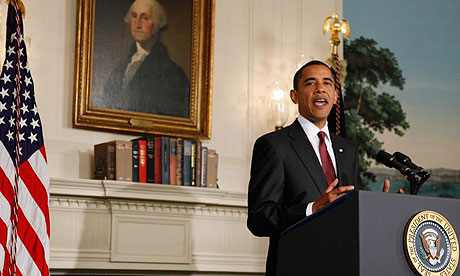The politics of quagmire

Barack Obama talks about healthcare at the White House. Photograph: Mark Wilson/Getty
Obama's message of bipartisan unity may have propelled him to the White House, but it also gave Pennsylvanians permission to deviate from the Democratic party line in the polling booth
(Obama's short coattails, 9 November 2008)
To me, last year's election was not a triumph of the Democratic "brand". Instead, Pennsylvanians voters' ticket-splitting was a victory of personality and policy over party. The mood of Americans over the past year have only underscored that impression.
Take the "missing" Barack Obama supporters. Having coasted to victory in part because of his widespread grassroots support, Obama was supposed to be able to unleash those supporters on issues at will. But his supporters are largely absent from the healthcare debate. Was his support superficial?
Hardly. The missing supporters happen to coincide with dropping approval ratings for congressional healthcare reform and growing pessimism about the country's political compass. For the first time under Obama, a majority of Americans think the country is "headed down the wrong track".
But it's not a conservative backlash to his policies. The underlying poll numbers show that Republicans are disliked more now than a year ago. At the same time, support for healthcare reform's government-run public health insurance option steadily grows, indicating that the darkening mood is coming from the left and centre, and in response to the too conservative approach to reform Congress and the president are taking.
Blame the US Senate. Due to a quirky procedural rule that requires 60 of 100 Senate votes to end debate on any bill or presidential appointment, power to pass laws resides in a small group of corporate-friendly, conservative Democrats. Obama's approach has been muted and focuses on consensus-building and compromise, a strategy suited to passing legislation through the Senate, but which has also resulted in a limping Frankenstein-monster healthcare bill loaded with taxpayer subsidies for private industry and containing a stripped-down and nearly impotent version of the public option. Hardly the stuff of "hope" and "change", or the "fierce urgency of now".
The danger here isn't that Obama supporters will vote in droves for Republicans in the upcoming midterm elections. It's that they will stay home, disillusioned with the government's politics-as-usual, under-the-table game of footsie with corporate America. Obama can change that, but only by matching the boldness of his rhetoric with real reforms.
A good start would be to pressure the Senate into fixing its procedural logjam.
To read the rest of the Cif America series looking back on Obama's 2008 election victory, click here




Currently have 0 cmments: